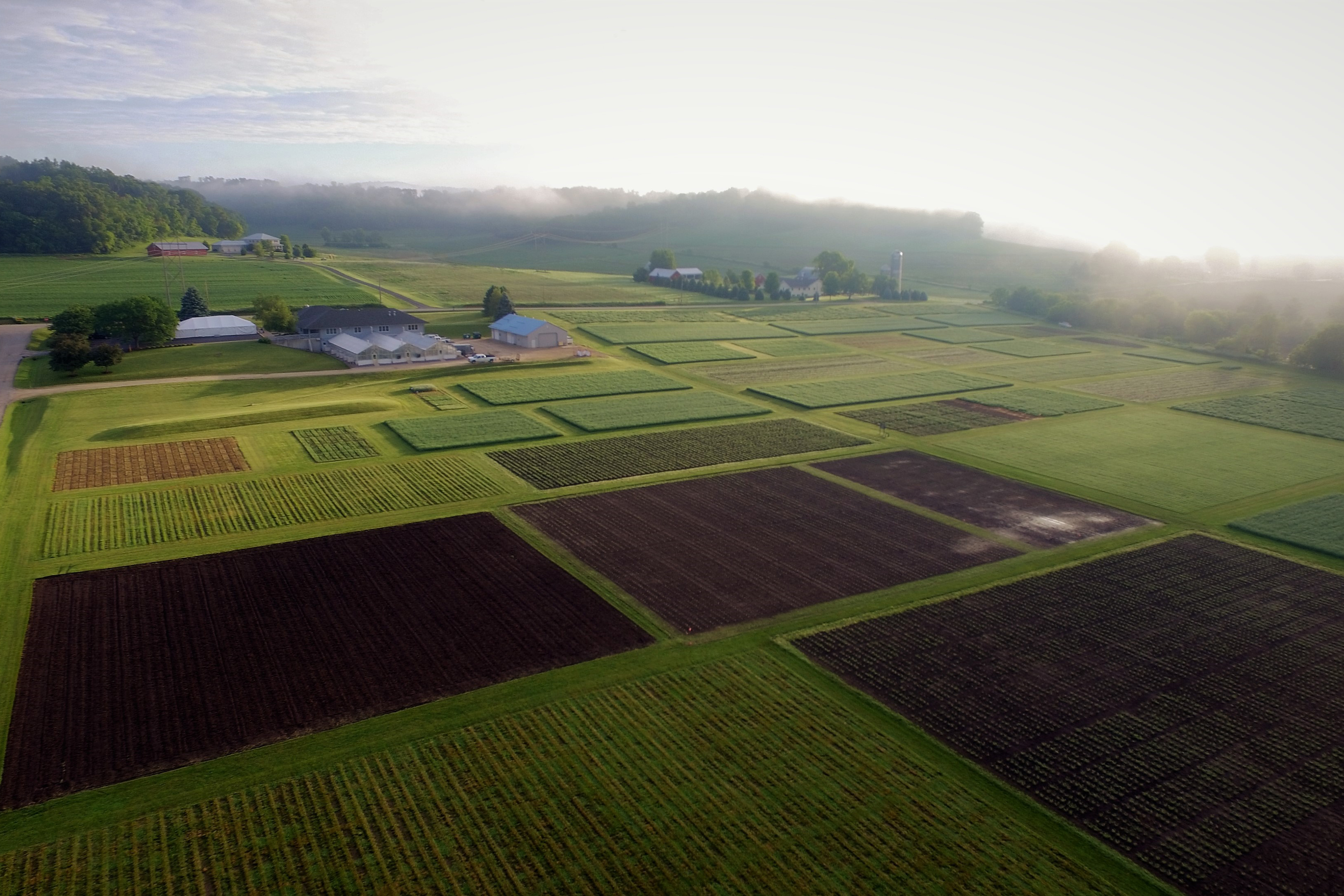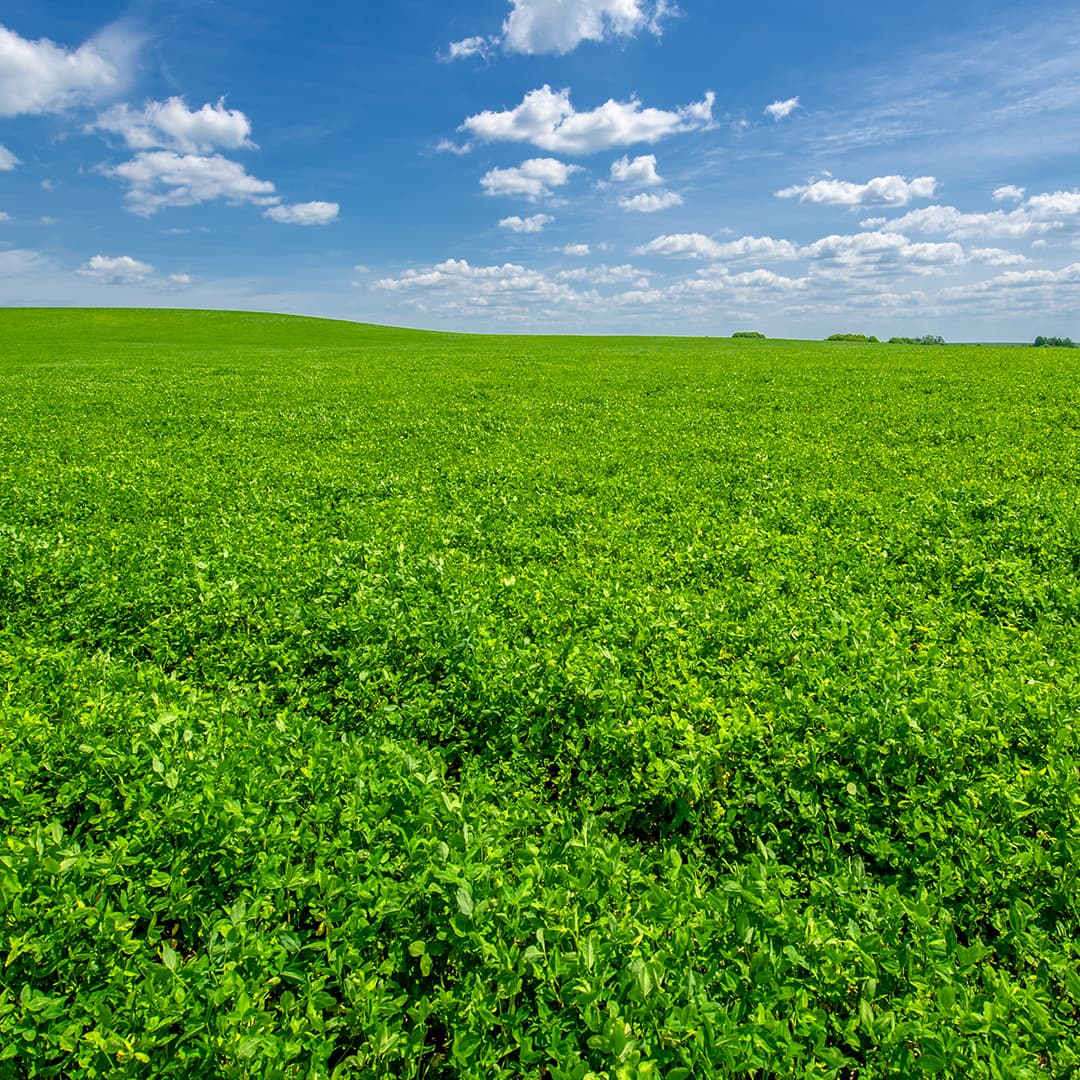There are a lot of factors to consider when choosing the right alfalfa for your operations.
Choosing alfalfa seed may seem less complicated than selecting corn or soybean genetics because there are fewer options and trait packages, but it’s a decision that has longer term impacts and a greater commitment requirement. Here are three questions to consider to help guide alfalfa seed purchase decisions in the coming year.
Regardless of the end use, most growers agree they look for high yield, solid quality, pest resistance and a persistent stand when choosing their alfalfa varieties.
Yield potential
Above all other factors, yield generally leads the discussion when it comes down to variety choice. Genetics play an important role, but climate variations, soil conditions, elevation and pest pressures also influence yield potential. All these factors work together to determine final tonnage, so it’s important to understand how specific varieties perform in your area and in similar field conditions, though this data may not always be available.
High-integrity yield data that is available, whether from a seed company or university, should highlight at least multiple-year or multiple-location data or both. However, choosing the highest yielding alfalfa isn’t necessarily the best option if the agronomics of that variety aren’t a good match for your fertility plan, soil characteristics or pest and weed management program.
Forage quality
The quality profile of your alfalfa is dependent on several factors, including genetics, traits, disease packages, environmental conditions and management practices. Historically, it hasn’t been uncommon to see higher quality alfalfa varieties result in lower yield. The HarvXtra alfalfa trait gives growers the flexibility to delay harvest while maintaining high-quality forage, so you no longer have to sacrifice quality for yield.
Pest resistance
Each alfalfa variety has a different tolerance for specific insect and disease pressures. While every year presents different levels of pest pressure, choosing varieties with inherent resistance to common alfalfa pests offers insurance against substantial yield loss.
Alfalfa breeding programs continue to focus on ways to improve disease resistance, such as with aphanomyces and anthracnose. Those seed options are especially impactful for dormant alfalfa growers in the Midwest and Northeast. Even in areas where these additional disease races haven’t been documented, we’d expect to see some secondary resistance benefits, including a tougher, more persistent plant.
Stand persistence
When you choose alfalfa seed, you are making a commitment for several years. Varieties with the UltraCut™ alfalfa disease package can provide disease and pest resistance, added stand persistence and reduced establishment cost over time. Advanced resistance like this gives growers an opportunity to increase overall revenue. Be sure to consider fall dormancy ratings and choose varieties that fit based on your cutting frequency, quality goals, geography and climate to avoid alfalfa injury and stand loss.
When considering data, ask questions about where the information is coming from. When was it collected, and which “check” varieties were used as comparisons? High-quality data is a result of good experimental design and execution; replication over multiple locations, plots and years; and strong statistical integrity. In addition, trials should include those competitive check varieties for comparison purposes. You should consider quantitative data such as yield, as well as qualitative data such as relative forage quality and fiber digestibility to help make seed decisions.
In addition to trial data from universities and seed companies, you should also collect your own on-farm observations. Document yield and quality information to help assess variety performance in your own fields, noting specific pest issues or stand problems can help you fine-tune your variety selection criteria for re-establishment.
For example, how well were stands established, and were weeds an issue? If so, you may want to consider varieties with more convenient weed control options. If you find your crop is constantly plagued by disease or insect pressures, you can look into varieties with higher pest resistance.
If your alfalfa crop’s quality or yield didn’t measure up last season, it may be time to consider newer genetics for 2023.
At a time when every dollar matters, it’s tempting to purchase the lowest cost seed. While the up-front cost may be less, older genetics probably mean less yield potential and lower quality over the life of the crop. Choosing the right alfalfa variety ultimately depends on each grower’s unique situation and management needs. While cost is one factor, it shouldn’t be the primary determining factor when choosing alfalfa seed.
Since alfalfa is a perennial crop, you’re committing to several years of yield and forage quality with an up-front purchase. Consider your operation’s forage goals and use sound data to help narrow down varieties with the agronomic and quality profiles to meet your specific needs.
You deserve seed that works as hard as you do. We can help. Contact your local alfalfa dealer for more information.
Choosing alfalfa seed may seem less complicated than selecting corn or soybean genetics because there are fewer options and trait packages, but it’s a decision that has longer term impacts and a greater commitment requirement. Here are three questions to consider to help guide alfalfa seed purchase decisions in the coming year.
1. What’s your management plan?
The end use of your alfalfa helps dictate your management plan. There may be different considerations for purchasing alfalfa seed that will be grown for cash hay versus alfalfa that will be fed on-farm. Overall crop management, including cutting frequency or total annual cuts, is one of the biggest factors in nailing down seed choice.Regardless of the end use, most growers agree they look for high yield, solid quality, pest resistance and a persistent stand when choosing their alfalfa varieties.
Yield potential
Above all other factors, yield generally leads the discussion when it comes down to variety choice. Genetics play an important role, but climate variations, soil conditions, elevation and pest pressures also influence yield potential. All these factors work together to determine final tonnage, so it’s important to understand how specific varieties perform in your area and in similar field conditions, though this data may not always be available.
High-integrity yield data that is available, whether from a seed company or university, should highlight at least multiple-year or multiple-location data or both. However, choosing the highest yielding alfalfa isn’t necessarily the best option if the agronomics of that variety aren’t a good match for your fertility plan, soil characteristics or pest and weed management program.
Forage quality
The quality profile of your alfalfa is dependent on several factors, including genetics, traits, disease packages, environmental conditions and management practices. Historically, it hasn’t been uncommon to see higher quality alfalfa varieties result in lower yield. The HarvXtra alfalfa trait gives growers the flexibility to delay harvest while maintaining high-quality forage, so you no longer have to sacrifice quality for yield.
Pest resistance
Each alfalfa variety has a different tolerance for specific insect and disease pressures. While every year presents different levels of pest pressure, choosing varieties with inherent resistance to common alfalfa pests offers insurance against substantial yield loss.
Alfalfa breeding programs continue to focus on ways to improve disease resistance, such as with aphanomyces and anthracnose. Those seed options are especially impactful for dormant alfalfa growers in the Midwest and Northeast. Even in areas where these additional disease races haven’t been documented, we’d expect to see some secondary resistance benefits, including a tougher, more persistent plant.
Stand persistence
When you choose alfalfa seed, you are making a commitment for several years. Varieties with the UltraCut™ alfalfa disease package can provide disease and pest resistance, added stand persistence and reduced establishment cost over time. Advanced resistance like this gives growers an opportunity to increase overall revenue. Be sure to consider fall dormancy ratings and choose varieties that fit based on your cutting frequency, quality goals, geography and climate to avoid alfalfa injury and stand loss.
2. What does the data say?
You’ll probably consider yield and quality data to help make variety decisions, especially when you are switching to new alfalfa varieties. More and more, there is less local data available for alfalfa variety comparisons, so growers often have limited data to make alfalfa seed decisions compared to data available for other crops.When considering data, ask questions about where the information is coming from. When was it collected, and which “check” varieties were used as comparisons? High-quality data is a result of good experimental design and execution; replication over multiple locations, plots and years; and strong statistical integrity. In addition, trials should include those competitive check varieties for comparison purposes. You should consider quantitative data such as yield, as well as qualitative data such as relative forage quality and fiber digestibility to help make seed decisions.
In addition to trial data from universities and seed companies, you should also collect your own on-farm observations. Document yield and quality information to help assess variety performance in your own fields, noting specific pest issues or stand problems can help you fine-tune your variety selection criteria for re-establishment.
3. Where can you improve?
Each growing season presents new challenges and different conditions for you and your crop. Over the life of your alfalfa, keep track of your major pain points and document observations you’ve made.For example, how well were stands established, and were weeds an issue? If so, you may want to consider varieties with more convenient weed control options. If you find your crop is constantly plagued by disease or insect pressures, you can look into varieties with higher pest resistance.
If your alfalfa crop’s quality or yield didn’t measure up last season, it may be time to consider newer genetics for 2023.
At a time when every dollar matters, it’s tempting to purchase the lowest cost seed. While the up-front cost may be less, older genetics probably mean less yield potential and lower quality over the life of the crop. Choosing the right alfalfa variety ultimately depends on each grower’s unique situation and management needs. While cost is one factor, it shouldn’t be the primary determining factor when choosing alfalfa seed.
Since alfalfa is a perennial crop, you’re committing to several years of yield and forage quality with an up-front purchase. Consider your operation’s forage goals and use sound data to help narrow down varieties with the agronomic and quality profiles to meet your specific needs.
You deserve seed that works as hard as you do. We can help. Contact your local alfalfa dealer for more information.



